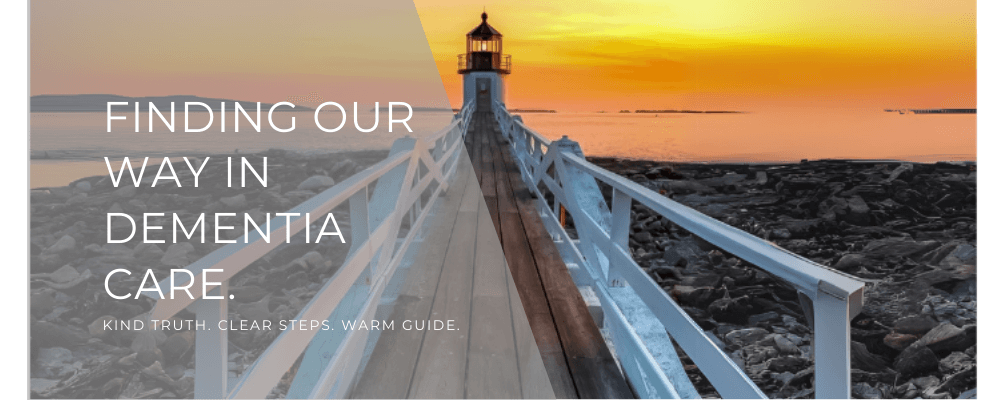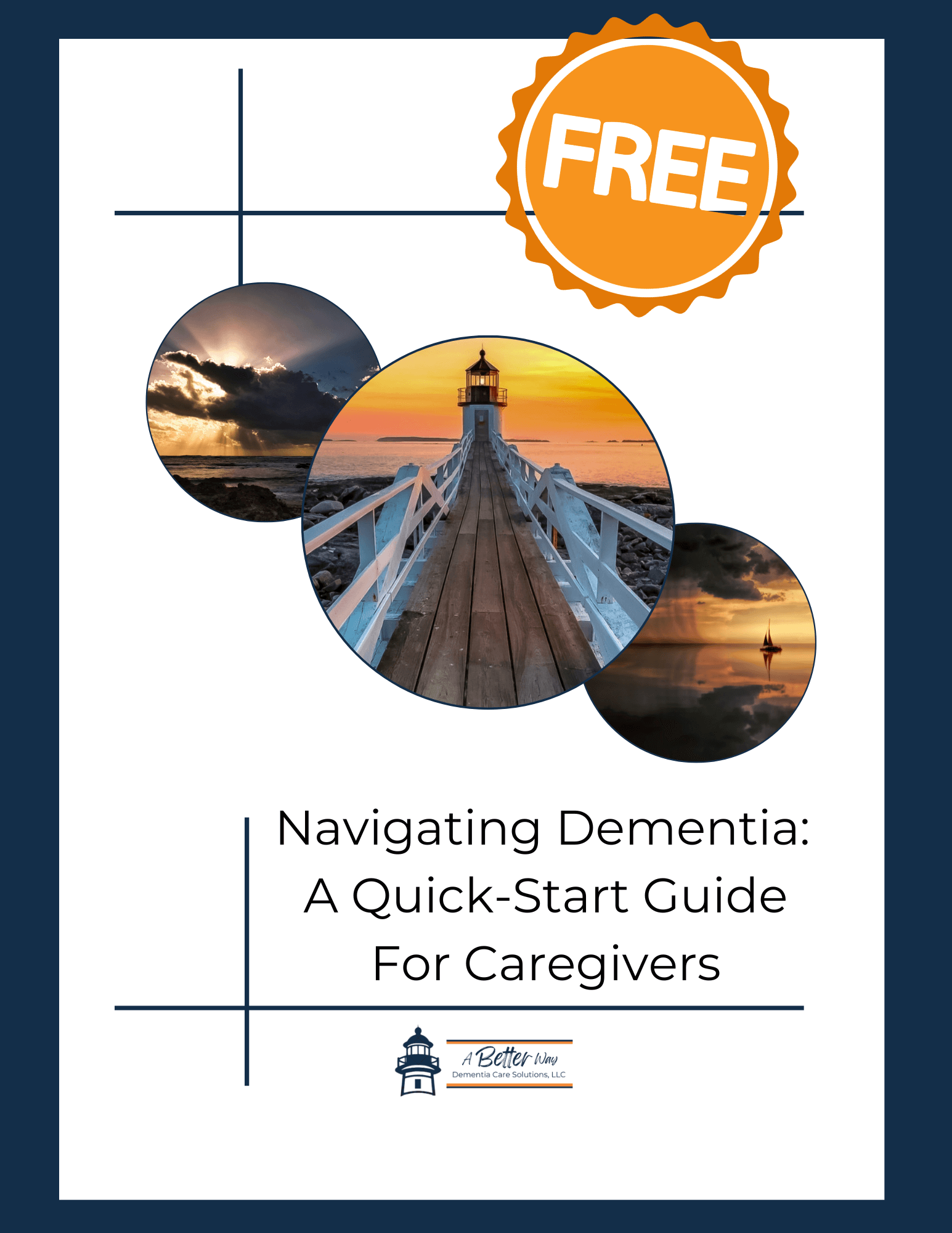
As we head into the holiday season, many caregivers are already feeling stretched. You might be juggling plans, adjusting routines, trying to create calm for the person you care for, and doing your best to keep your own energy steady. The holidays ask a lot, and it can feel like you are preparing two parallel celebrations. One that everyone else sees, and another that centers around what the person you care for can handle.
Right now you may be thinking about Thanksgiving next week, or the gatherings and expectations coming up in December. Even before the holidays begin, your brain is already running through what might be too loud, too busy, too bright, or too unpredictable. This is the invisible work caregivers do every single day, and it becomes heavier during the holidays.
One thing I often see in my work is that the hardest part of the holiday season is not always the holiday itself. It is the stretch that comes after. When routines are off, the environment has changed, the energy has shifted, and everyone is a little worn down. Many caregivers describe that early January slump as something that sneaks up on them.
This post is meant to support you before that moment hits. Think of it as a quiet plan for your future self. You do not need to be in recovery mode yet, but you can put a few things in place now that will help you move through the holidays with more steadiness and land in the new year with less overwhelm.
At the end, you will find a free holiday checklist you can use now and again after the holidays to help you stay grounded through every stage of the season.
Let’s walk through this together.
WHY PREPARING FOR POST HOLIDAY STRESS BEFORE THE HOLIDAYS MATTERS
You may wonder why we are talking about post holiday stress when the holidays have not even happened yet. Here is the simple truth. The holidays create a ripple effect for people living with dementia and for caregivers. When routines shift and the environment becomes busy or unfamiliar, it often takes time for things to settle again.
Planning ahead is not about expecting things to go wrong. It is about giving yourself breathing room on the other side.
Here are a few reasons planning now helps:
Your nervous system is already working hard.
Caregivers often spend November and December in a constant state of anticipation. You are trying to predict needs, avoid overstimulation, and make the season meaningful without overwhelming anyone. That emotional load adds up long before the actual celebrations begin.
Routines will shift no matter how well you plan.
Even small changes like later mealtimes, changes in lighting, or extra voices in the home can disrupt the rhythm that helps the person you care for feel safe. These shifts often show up later, not in the moment.
Post holiday stress is easier to handle when you expect it.
When you understand why the person you care for might seem more confused, restless, or tired after the holidays, you can respond with patience instead of worry.
Your own recovery needs deserve support.
Caregivers often move from one responsibility to the next without giving themselves time to recover. Planning ahead gives you permission to pace yourself.
You do not need a complicated plan. Just a few clear steps you can return to when the holidays end and the new year begins.
WHAT I OFTEN SEE IN CAREGIVERS AFTER THE HOLIDAYS
Over the years, I have noticed patterns in how caregivers feel once the holiday season wraps up. Even though we are not there yet, understanding these patterns now can help you care for yourself through the next six weeks.
Caregivers often describe:
• deep fatigue
• feeling like the house is “off rhythm”
• more confusion or irritability in the person they care for
• new or stronger feelings of grief
• guilt about not enjoying the holidays the way they hoped
• a sense of hitting a wall emotionally
• trouble restarting routines
• pressure to set goals or jump into the new year before they even feel ready
You do not need to predict or prevent all of this. You just need a plan that lets you meet these moments with calm instead of scrambling.
WHAT THE PERSON YOU CARE FOR MAY EXPERIENCE AFTER THE HOLIDAYS
People living with dementia often feel the aftereffects of the holidays more than anyone else. Even positive stimulation can be taxing on the brain.
Some common post holiday reactions include:
• slower processing
• increased confusion
• changes in sleep patterns
• more shadowing or clinginess
• difficulty with familiar tasks
• reduced appetite or increased snacking
• restlessness or pacing
• trouble settling into the day
These reactions are usually temporary. They come from disrupted routines, increased sensory stimulation, and changes in their environment.
When you know these patterns ahead of time, you can adjust expectations and create space for a gentler recovery.
STEP ONE: SET YOUR EXPECTATIONS REALISTICALLY NOW
One of the kindest things you can do for yourself is to get honest about what the holidays will require. This is not about lowering the bar. It is about protecting your energy.
Ask yourself:
• What parts of the holiday season usually drain me?
• What parts bring me or the person I care for joy?
• What can be simplified?
• What can be skipped?
• What can be planned early so I am not rushing later?
The more clarity you have now, the less pressure you will feel in January.
STEP TWO: BUILD A GENTLE EXIT PLAN FROM THE HOLIDAYS
You know the days after the holidays tend to feel unsettled. Instead of waiting until that moment, prepare a soft landing.
Here are a few supportive steps:
Plan one quiet day after each holiday.
Choose a day where you keep expectations low. No visitors. No big tasks. Simple meals. Recovery time for both of you.
Restore routines slowly.
Do not expect the person you care for to return to their normal pace immediately. You can begin rebuilding structure in small, predictable pieces.
Reintroduce familiar sensory cues.
Soft lighting, calm music, warm blankets, and familiar objects help the brain recalibrate.
Prepare simple meals you can repeat.
Freezing portions or planning leftover nights keeps you from needing to cook when you are tired.
Communicate boundaries early.
If family expect you to jump right back into normal life, let them know ahead of time that you will be keeping things quiet after the holidays.
These small steps will support your future self when you are tired and trying to regain your footing.
STEP THREE: PROTECT THE ENVIRONMENT THROUGHOUT THE HOLIDAYS
Your environment is one of your strongest tools throughout the season. Managing sensory input before overstimulation sets in can prevent emotional fallout later.
A few strategies that help:
Keep one room as a calm space.
Regardless of visitors or gatherings, this room stays predictable. Familiar furniture, soft lighting, reduced noise.
Limit visual clutter.
Decorations can be lovely, but too many objects or blinking lights can create visual overwhelm.
Plan structured transitions.
Arrivals and departures can be overstimulating. Slow transitions help the brain adapt.
Watch for early signs of overload.
You know the cues better than anyone. If you notice restlessness, frustration, or zoning out, take a break before it escalates.
Rotate stimulation.
A noisy kitchen, then a quiet room. A lively gathering, then a short walk. Balance helps.
These strategies will not prevent all stress, but they set the stage for a steadier recovery later.
STEP FOUR: CARE FOR YOURSELF ALONG THE WAY
Self care during the holidays does not need to be elaborate. It needs to be real, quick, and doable.
Here are small ways to support yourself:
• Keep a water bottle nearby
• Lower expectations instead of pushing through
• Take five minutes in the bathroom if you need a reset
• Name one feeling you are having
• Let your shoulders drop whenever you think of it
• Give yourself permission to not please everyone
You deserve moments of repair throughout the season, not just after it ends.
STEP FIVE: OBSERVE WHAT HELPS AND WHAT HURTS
While you move through Thanksgiving and the December holidays, pay attention to what supports the person you care for and what adds stress. These observations will guide your recovery in January.
You might notice:
• certain times of day feel easier
• smaller gatherings work better
• specific foods bring calm
• too much noise creates overwhelm
• routines help more than you expected
• certain people are grounding, while others are stressful
These details matter. They help you plan your post holiday reset and shape how you approach next year.
STEP SIX: CREATE YOUR POST HOLIDAY RESET PLAN NOW
This does not need to be complicated. Think of it as a soft structure you can fall back on when the holidays wrap up.
Consider including:
• one quiet day after each holiday
• two or three simple meals you can make without effort
• one routine you will bring back first
• one space at home you will return to calm
• one person you can reach out to if you feel overwhelmed
Planning these now keeps you from needing to think about them when you are tired.
STEP SEVEN: GET THE FREE HOLIDAY RESET CHECKLIST
If you want a simple one page holiday reset checklist that you can print, save, or keep on your fridge, you can grab it below. It will help you move through the holidays with a little more calm and give you a clear plan when things start to feel busy.
You will also receive my weekly Monday email with the newest blog post, a quick caregiving tip, and updates on new resources.
IF YOU ARE MOVING THROUGH THE HOLIDAYS FEELING STRETCHED THIN, I AM HERE.
My dementia care coaching sessions give you a calm space to sort through what is working, what feels hard, and what would help you feel steadier day to day. We build a simple plan that fits your real life, not an ideal one.
If you want support, clarity, or even just someone who understands what you are carrying, you can learn more or schedule a session here: CLICK HERE
Notes
- Alzheimer’s Association. (2021). https://www.alz.org/getmedia/f7b40c51-5ff7-4bc8-9056-342754d6cc65/alzheimers-dementia-related-behaviors-ts.pdf
- Alzheimer’s, Los Angeles. (2023). Holiday Tips For Caregivers. https://www.alzheimersla.org/holiday-tips-for-caregivers-2023/
- National Institute on Aging. (2023). Caring for a person with Alzheimer’s disease. https://www.nia.nih.gov/health/alzheimers-caregiving
- World Health Organization. (2023). Dementia: Key facts.https://www.who.int/news-room/fact-sheets/detail/dementia
Affiliate Disclosure
A Better Way - Dementia Care Solutions, LLC participates in the Amazon Associates Program, which means we earn a small commission when you buy through links on our site, at no extra cost to you. We only recommend products that we believe can help caregivers on their journey.
Disclaimer
The information provided in this blog is for educational purposes only and should not be considered medical advice. Always consult with a doctor or a licensed physical therapist before starting any new exercise routine, using assistive devices, or following the recommendations mentioned. Every individual’s needs are different, and professional guidance is essential to ensure safety and appropriateness of care.
Want to keep figuring this out together?
Subscribe to Finding Our Way in Dementia Care and get honest stories, helpful tips, and gentle support delivered to your inbox every week. Just real talk, grounded care, and space to breathe.
Subscribe to Finding Our Way in Dementia Care and get honest stories, helpful tips, and gentle support delivered to your inbox every week. Just real talk, grounded care, and space to breathe.
Kind truth. Clear steps. Warm guide.
















0 Comments